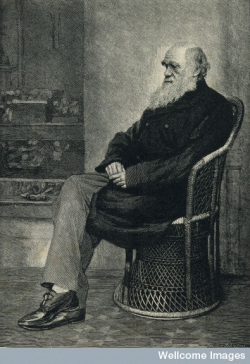Charles Darwin

Charles Darwin
- Born
- 12 February 1809
- Died
- 19 April 1882 (age 73)
Darwin's father once told him he would be a disgrace to his family, instead he became one of the most influential biologist of all time. Charles Darwin’s theory of evolution by natural selection is now generally accepted and his legacy of scientific enquiry remains with us to this day.
Darwin learnt the basic principles of scientific experimentation at the age of 13 when he set up a chemistry laboratory in the garden shed with his brother. However, at the age of 16, his father took him out of school, criticising him for his poor grades and idleness. He was sent to medical school in Edinburgh but did not like the sight of blood and was bored by studying medicine.
At the end of his first year he spent the summer hiking in the Welsh hills and read Gilbert White’s The Natural History of Selbourne, which enthused him about the natural world. He started to make detailed observations of birds and their habits. During his second year at university he joined the Plinian Society where he was exposed to the ideas of scientific investigation.
He then quit medical school and went to Cambridge to study for the clergy, where he spent most of his free time collecting beetles, reading and seeing friends. In 1828, Darwin’s cousin, William Darwin Fox, introduced him to the Reverend John Stevens Henslow, professor of botany at Cambridge. Darwin went to his lectures and decided that his future lay in natural history.
The most famous biologist in history
Henslow invited Darwin on a voyage on HMS Beagle around South America and introduced Darwin to Adam Sedgwick who gave him a crash course in geology. Darwin's family thought it would be another idle pursuit but eventually allowed him to go on the trip.
When Darwin set out, most Europeans believed God had created the world in seven days. On the journey, Darwin read Charles Lyell’s Principles of Geology which argued that fossils in rocks were evidence that animals had lived thousands or millions of years ago. Darwin saw the rich variety of wildlife on his journey and significantly, he noticed in the Galapagos Islands that each island had a population of finch that were closely related, but with key differences.
He established that all species have descended from common ancestors and in common with Alfred Russell Wallace, introduced the theory that the branching pattern of evolution resulted from natural selection. Before this, no one had been able to explain how species became more suited to their environment over time.
His theory of evolution was published in his 1859 book, On the Origin of Species. His findings were hailed by many as progress, but drew much criticism from others, including some clergy. It was not until the 1930s and the emergence of the modern evolutionary synthesis that there was a broad consensus that natural selection was the basic mechanism of evolution. The principles of evolutionary biology are founded on his work.



